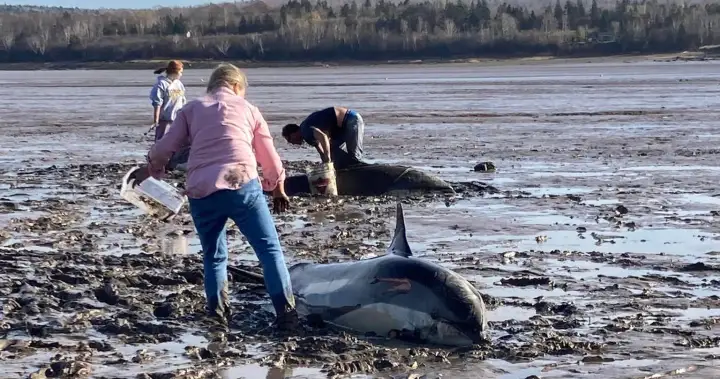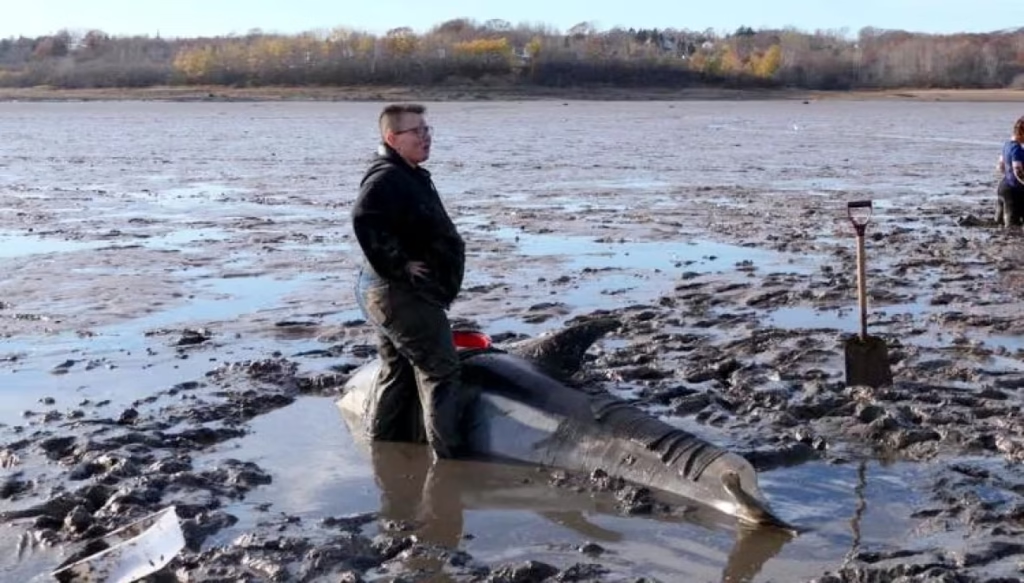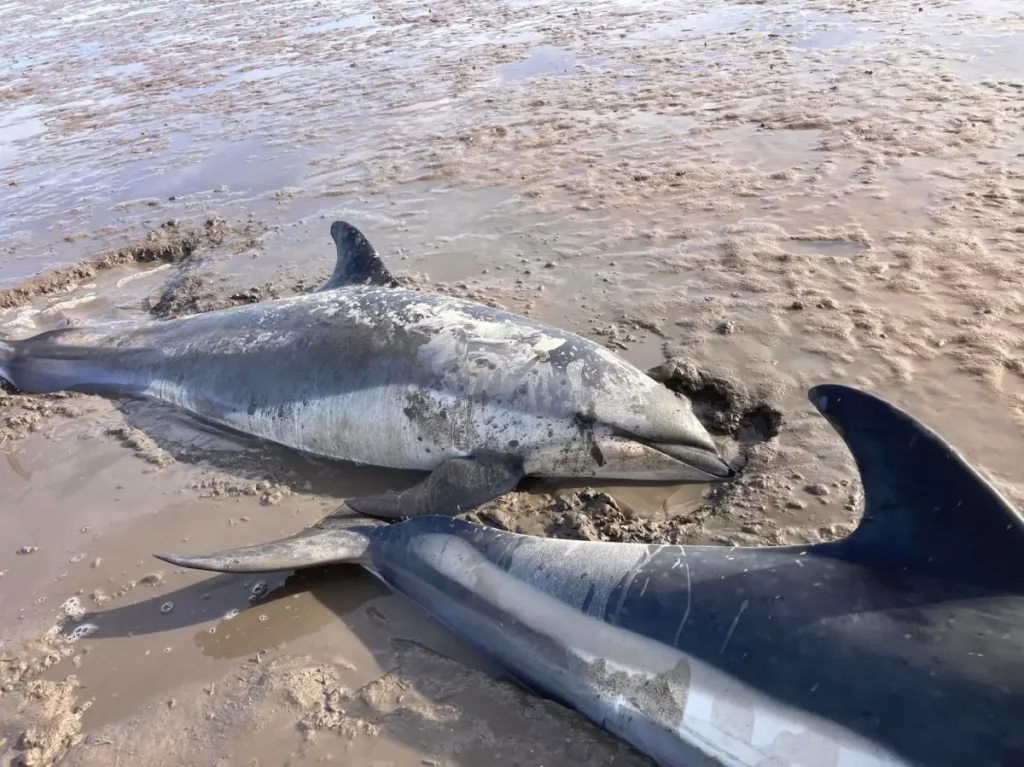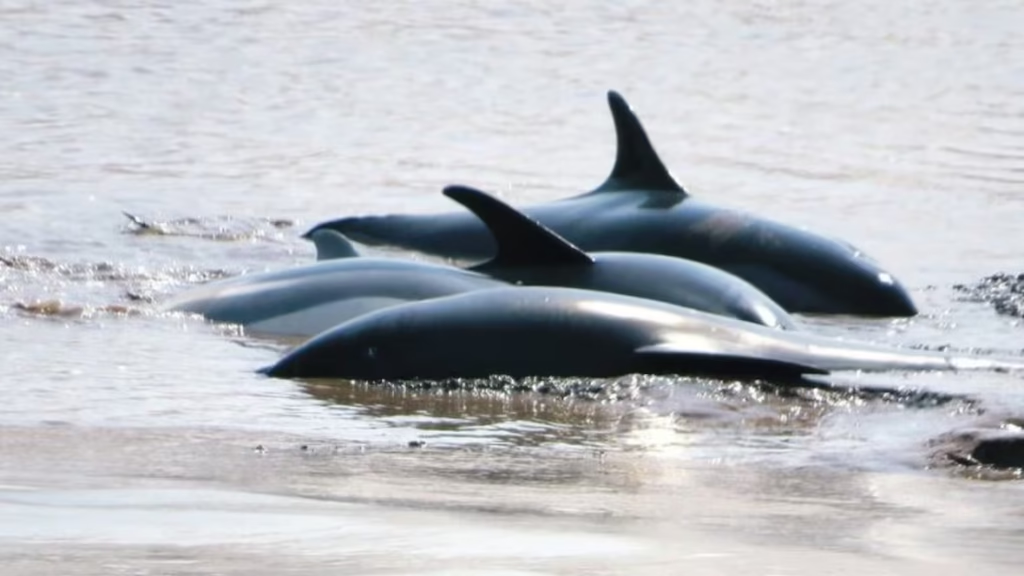
Community comes together to rescue stranded dolphins in Digby
On the shores of Digby, Nova Scotia, where the powerful tides of the Bay of Fundy shape the coastline, a heart-wrenching scene unfolded. Sixteen Atlantic white-sided dolphins were found stranded, helpless on the beach as the tide receded. For these magnificent marine mammals, being out of the water is a life-threatening emergency. Time was running out, and with the official marine rescue team hours away, hope began to fade.
But the spirit of a community can be as powerful as the tide itself.
A Community Springs into Action

Word of the dolphins’ plight spread quickly through the small town. Rather than standing by, the people of Digby sprang into action. In a remarkable display of spontaneous and coordinated effort, local volunteer firefighters and around 40 community members rushed to the shore.
They didn’t have specialized equipment, but they had ingenuity, compassion, and a shared determination to help. Wading into the cold Atlantic waters, this team of neighbours, friends, and volunteers worked together with incredible care. They gently manoeuvred the large, heavy dolphins onto tarps and sleds. With immense effort, they carefully carried and guided each animal back into the life-giving sea.
The scene was a testament to the power of collective action. Each person played a role in the delicate, strenuous process, ensuring the dolphins were handled with the gentleness required to prevent further injury or stress. It was a beautifully coordinated, life-saving effort, born not from a formal directive, but from a shared sense of responsibility.
Why Do Dolphins Beach Themselves?

While the scene in Digby was alarming, dolphin strandings, also known as beachings, are a phenomenon that scientists are still working to fully understand. There is often no single cause, but several factors can contribute:
- Illness or Injury: A sick or injured dolphin may become disoriented and swim ashore. Sometimes, the entire pod will follow a sick leader due to their strong social bonds.
- Navigational Errors: Dolphins use echolocation to navigate. Complex coastlines, gently sloping seabeds, or unusual tidal currents—like those in the Bay of Fundy—can sometimes confuse their natural sonar, leading them astray.
- Chasing Prey: In the heat of a chase, dolphins might follow fish into shallow waters and get trapped by a rapidly receding tide.
- Extreme Weather: Powerful storms can disorient marine life and push them off course and toward the shore.
What You Can Do If You Find a Stranded Marine Animal
The residents of Digby did the right thing by taking immediate, careful action when experts were unavailable. However, authorities generally advise a specific protocol to ensure the safety of both the animals and the people trying to help. If you ever find a beached dolphin or whale, here are the most important steps to take:
- Call for Help Immediately: Your first action should always be to contact your local marine animal rescue organization or authorities. They have the training and equipment to handle the situation safely and effectively.
- Do Not Push the Animal Back: Pushing a stranded animal back into the sea may seem logical, but if it is sick or injured, it will likely just wash ashore again. It also causes immense stress and can lead to injury.
- Keep it Cool and Wet: A dolphin’s skin is not meant to be in the dry air and can quickly get damaged. If you can do so safely, use buckets to pour water over its body, but be extremely careful to avoid pouring water into its blowhole (the breathing hole on top of its head).
- Provide Space: Keep crowds away and noise to a minimum. Stress can be fatal to an already weakened animal. Your presence should be calm and reassuring.
An Ocean of Hope

The story of the Digby dolphin rescue is more than just a feel-good news item; it is a powerful reminder of our connection to the natural world and to each other. In a moment of crisis, ordinary people became heroes. They saw a need and met it with courage, empathy, and teamwork.
This event in Nova Scotia shows us that compassion isn’t just a feeling—it’s an action. It’s the choice to wade into cold water, to lift something heavy, and to work together to give a life a second chance. The 16 dolphins that swam back into the deep thanks to the people of Digby are a symbol of hope, proving that a small group of determined individuals can truly make a world of difference.
🧩 Related Articles:
- Glowing Together: How Maryland Communities Are Reviving Firefly Habitats Across the Chesapeake Bay Watershed to Protect Biodiversity and Inspire Environmental Stewardship in the USA
- The United Kingdom’s Compassion Capital: Liverpool Crowned Britain’s Kindest City, Proving Small Acts of Generosity Forge the Strongest Communities
- From Cranberries to Conservation: How Massachusetts is Transforming Declining Bogs into Thriving Wetlands that Protect Wildlife, Clean Water, and Inspire a Greener Future
- Read the Official giffgaff Kindness Survey Results



